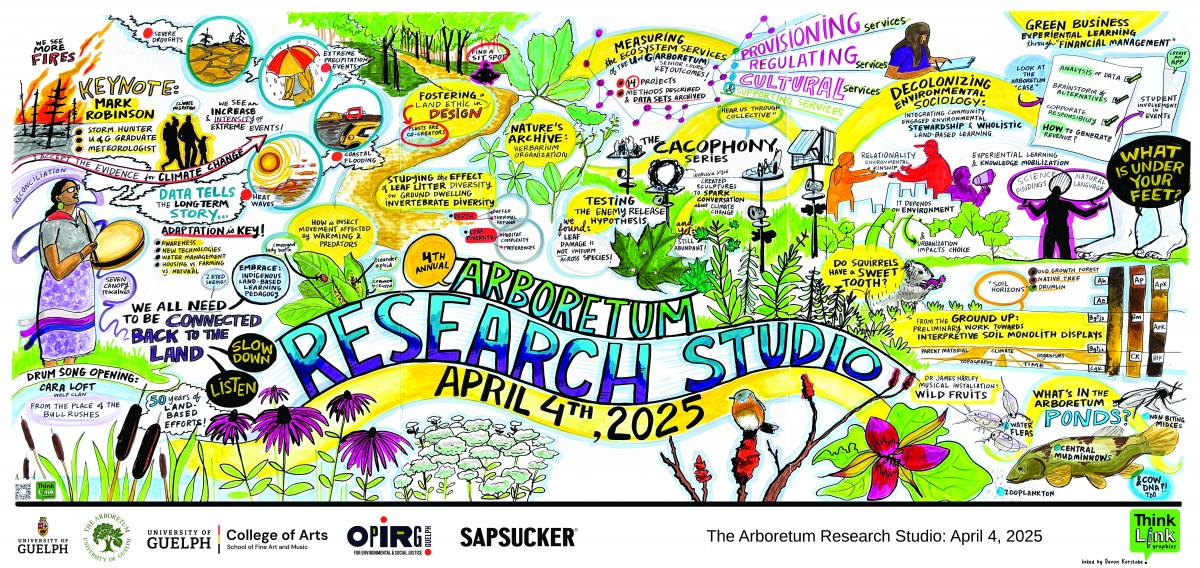Research Studio 2025
This year's Research Studio took place in the afternoon on April 4th, 2025. The Arboretum Research Studio furthers the Arboretum’s mission to conserve biodiversity and connect people to nature through research, teaching and campus and community engagement. Over the afternoon, presentations covered a variety of topics by students, faculty, and staff from a variety of disciplines and five colleges across the University of Guelph community.

Keynote Presentation
UofG grad Mark Robinson was a lively Keynote Speaker for this year's Research Studio. Mark presented "Ontario in a Changing Climate." Climate change is going to hit Ontario, but perhaps not as bad as other areas in North America. Preparing and adapting to these changes will be a key part of the future of our region.
Mark Robinson is a Canadian television meteorologist and storm chaser. He co-hosts the television series Storm Hunters and Unearthed, has appeared on the television series Angry Planet, and has made numerous other media appearances. In 2015, Robinson was named one of Canada's 100 greatest modern-day explorers by Canadian Geographic, and was elected a Fellow of the Royal Canadian Geographic Society. Robinson is working on a new book: Unprecedented: On the Front Lines of Climate Change.
Research Presentations
| Title of Presentation | Presenter (s) | Affiliation | Project Description | Link to Video |
|---|---|---|---|---|
| Decolonized and Indigenized Learning Methodologies: Land Based Learning Pedagogy | Cara Loft | The Office of Teaching and Learning | Cara will be presenting on my decolonization efforts with the Guelph Arboretum over the past 8 months. Including a Seven Canopies Walk and Winter Time Storytelling. | |
| Studying the Effect of Leaf Litter Diversity on Ground Dwelling Invertebrate Diversity | William Oliver, Gavin Duffield, Adrianna McPolin, and Mitchell Duchene | College of Biological Science | This group hypothesized that leaf litter diversity would support more diverse ground dwelling invertebrate communities by creating a more complex habitat where niche overlap is reduced. They sampled quadrats in Victoria and Wild Goose woods and did not find support for this hypothesis. However, they did find that increased leaf litter depth reduced temperature differences between the air and ground, meaning the amount of leaf litter may effect the thermal refuge it provides for ground dwelling invertebrates. | https://youtu.be/Rju5of-U9KY |
| Testing the Enemy Release Hypothesis | Karys Brichon, David Wee, Bryce Williams, and Braydon Amaro | College of Biological Science | This group focused on how leaf damage caused by enemy herbivores differed between invasive plants and their native congeners. They hypothesized that enemy herbivores would cause more damage to native plants than related invasive plants, based on the enemy release hypothesis. They, subsequently, predicted we will see more leaf damage caused by enemy herbivores on native plants compared to their invasive congeners. Additionally, they predicted they would see a higher abundance of invasive plants than closely related native plants. | https://youtu.be/YzvW1FHlK6E |
| How is Insect Movement Affected by Warming and Predators? | Kaitlyn Robinson | College of Biological Science | Dispersal, defined as the movement from one habitat patch to another, is a vital process for animals to undertake. Warming temperatures and predator presence affect dispersal separately, but what happens when these two variables interact? | |
| Nature's Archive: Herbarium Organization | Mikaela Ryan | Centennial College | This presentation will recap her work organizing the Arboretum's historical herbarium. The herbarium is in the R.J. Hilton building and contains thousands of samples collected by the Arboretum's first leaders. She will summarize what she have done and the kinds of samples she has found. | https://youtu.be/tq-rOsqMjj4 |
| Fostering a Land Ethic in Design | Heather Schibli | Ontario Agricultural College, Landscape Architecture | Unlike many other programs at the University, landscape architecture offers an accredited professional degree through which most graduates continue their journey practicing landscape architecture in the private and public sectors. It is our responsibility as educators to instill a familiarity, respect, and appreciation for the land as they learn about the profession. This presentation highlights land-based learning at the University of Guelph Arboretum. | https://youtu.be/y3zHP3OETXE |
| What’s in the Arboretum ponds? | Shaylah Kearley | College of Biological Science | An examination of the environmental DNA collected from the Victoria Woods pond in the Arboretum for the Fall 2024 BIOL*4350 class. Featuring zooplankton, insects, fishes, and even cows!—What can these results tell us about environmental DNA and the Arboretum ponds? | https://youtu.be/klliHZCSOFs |
| The Cacophony Series | Micheal Hansen | College of Arts (IICSI) with students and teacher from John F. Ross Collegiate Vocational Institute |
The Hear Us Through Collective is student, teacher, and PhD student driven community arts project. We have constructed a collection of kinetic wind powered record player focused sound sculptures that reflect a story of what could happen. The collective are presenting an interpretation of a fable to express a future of preserved areas effected by climate change. The sculptures use found and thrifted materials and sounds. |
https://youtu.be/fhmv4B8SFWg |
| From the Ground Up: Preliminary Work Towards Interpretive Soil Monolith Displays for the University of Guelph Arboretum | Fiona Braund , Jardine Lam-Colling, Katherine Norman, Sophia Klassen, Tess Bradbury-Kidd | School of Environmental Sciences | Students from the ENVS4001/4002 Projects in Environmental Science course working alongside the Arboretum Staff to create a plan for a interpretive trail within the arboretum. The trail will be based on the soils found in the arboretum and the soil forming factors that led to how they are today. | https://youtu.be/65egaoxfVJo |
| Measuring the Ecosystem Services of the University of Guelph’s Arboretum: Key Outcomes from a Senior Undergraduate Course | Aaron Berg | College of Social and Applied Human Sciences | Ecosystem services, or the benefits human obtain from ecosystems must be important consideration in how we understand or value an ecosystem. As part of joint graduate and 4th year project students learned about several measurement-based approaches for assessing the ecosystem services provided by the arboretum. Some highlights of these projects will be presented as part of this presentation. | https://youtu.be/5aNcUV2OjQY |
| Do Squirrels Have a Sweet Tooth? : Investigating the Effect of Urbanization on Food Selection in Eastern Grey Squirrels (Sciurus carolinensis) | Lindsey Wamboldt, Audrey, Kailey Greenwood, and Manja Enns | College of Biological Science | "The objective was to investigate how changes in human activity levels, due to urbanization, influence food selection in eastern grey squirrels (Sciurus carolinensis). This was done using a cafeteria-style experiment and by sampling 10 peri-urban and urban sites on the Guelph campus. " | https://youtu.be/rllYNkdQRXE |
| Decolonizing Environmental Sociology: Integrating Community Engaged Environmental Stewardship and Wholistic Land-Based Learning in the Arboretum | Jeji Varghese and Spencer Martens | College of Social and Applied Human Sciences | The presentation will overview how we've incorporated the Arboretum into a second-year undergraduate course (SOC*2280: Society, Knowledge Systems and Environment) through two assignments. We'll focus on a land pedagogy assignment and Community-Engaged Learning projects with the Arboretum as a community partner. | https://youtu.be/y2Xvwx6IiLA |
| Green Business: Experiential Learning with the Arboretum in a Third-Year Financial Management Course | Daniela Senkl | LANG School of Business | Students in this business class worked to develop and assess potential revenue generation opportunities for the Arboretum as a part of their course assignments. Students engaged in the real-world application of financial management tools while honoring the vision and values of the Arboretum. | https://youtu.be/8bgo7eNEKn0 |
We will end the day with an installation by retiring music faculty Dr. James Harley. Wild Fruits: Soundscape Compositions for immersive sounds (2003-2024)
These five works use sounds recorded from locations like the Arboretum, including birds, frogs, insects, along with wind in the trees, rustling leaves, footstep on trails, and much else. There are also spoken word excerpts from two important naturalist writers: Henry David Thoreau—Wild Fruits, and Annie Dillard—Pilgrim At Tinker Creek. The sounds have been extensively treated in the studio, and have been produced to provide an immersive listening experience using multiple loudspeakers around the audience. This cycle of soundscape pieces loosely follows the seasons, starting with spring.
Jim Harley's Wild Fruits is supported in part by funding from the Social Sciences and Humanities Research Council.
A special thank you to the sponsors of the 2025 Research Studio:


